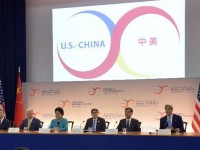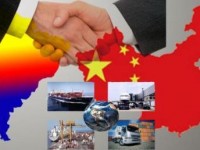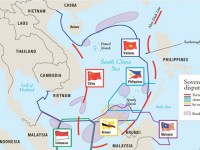
Zhang Wenzong, Associate Research Fellow, CICIR
Jun 22, 2015
Talks on the bilateral investment, the South China Sea and military-to-military relations should help leaders and people in both countries confidence in each other and make China-US relations stand the test of challenging times.
Doug Bandow, Senior Fellow, Cato Institute
Jun 19, 2015
There is increasing commentary among the chattering classes about the importance of making China “pay a price” for its aggressive behavior, but the possibility of miscalculation and misjudgment makes it even more important that all participants step back from confrontation.
Stewart Taggart, Founder & Principal, Grenatec
Jun 15, 2015
Could China’s export infrastructure drive be at risk from its actions in the South China Sea? To win overseas infrastructure contracts, China may have to choose between a trouble free ‘going out’ strategy, and an aggressive ‘island-building’ South China Sea policy.
Zhao Minghao, Professor, Institute of International Studies at Fudan University, and China Forum Expert
Jun 12, 2015
The U.S.-China Strategic Dialogue, the seventh of its kind, will take place soon amidst an increasing rivalry between the two countries. Ensuring stable peace and continued prosperity in the Asia-Pacific region will require both countries to replace their self-serving interpretations of the other’s strategic intentions with more sober assessments.
Hugh White, Professor of Strategic Studies, National University of Australia
Jun 11, 2015
What exactly is America's gripe with China in the South China Sea? The question becomes more and more important as the future of the world's most vital bilateral relationship becomes more and more dependent on what happens in this much-contested waterway. And the answer is not very clear.
Yin Chengde, Research Fellow, China Foundation for International Studies
Jun 11, 2015
U.S. Secretary of Defense Ashton Carter’s speech at the just concluded Shangri-La Dialogue had a theme of attacking China. He irresponsibly dumped blame on China for its construction activities on its own isles and reefs in the South China Sea, accusing China of sabotaging security in the Asia Pacific.

Ted Galen Carpenter, Senior Fellow, Randolph Bourne Institute
Jun 08, 2015
With good reason, Chinese leaders wonder whether the pivot to Asia is the initial stage of a containment policy directed against their country. Similarly, U.S. officials are likely to become concerned about China’s attention and investment in Latin America, not helped by suspicions about China’s intentions in the South China Sea.
Michael Swaine, Senior Associate,Carnegie Endowment for Int'l Peace
Jun 05, 2015
The ongoing dispute threatens to drive U.S.-China relations permanently in a far more adversarial, zero-sum direction and destabilize the region.
Chen Jimin, Guest Researcher, Center for Peace and Development Studies, China Association for International Friendly Contact
Jun 02, 2015
The ongoing series of high-level meetings show that, despite pressures from third-party players, Beijing and Washington value a cooperative relationship and mutual understanding that should continue to strengthen.

Shen Dingli, Professor, Institute of International Studies, Fudan University
May 29, 2015
China’s reclamation work offshore is not threats to other countries, but will improve the region’s weather forecasting and maritime-rescue capacity. The US and other countries, as well as international organizations, will be welcome to make use of the facilities it will build, so as to advance cooperation on humanitarian aid and disaster relief.
Back to Top

- China-US Focus builds trust and understanding between the U.S. and China through open dialogue among thought leaders.
- Our Offerings
- Topics
- Videos
- Podcasts
- Columnists
- Research Reports
- Focus Digest
- Stay Connected
-
Thanks for signing up!
- Get the latest stories from China-US Focus weekly.